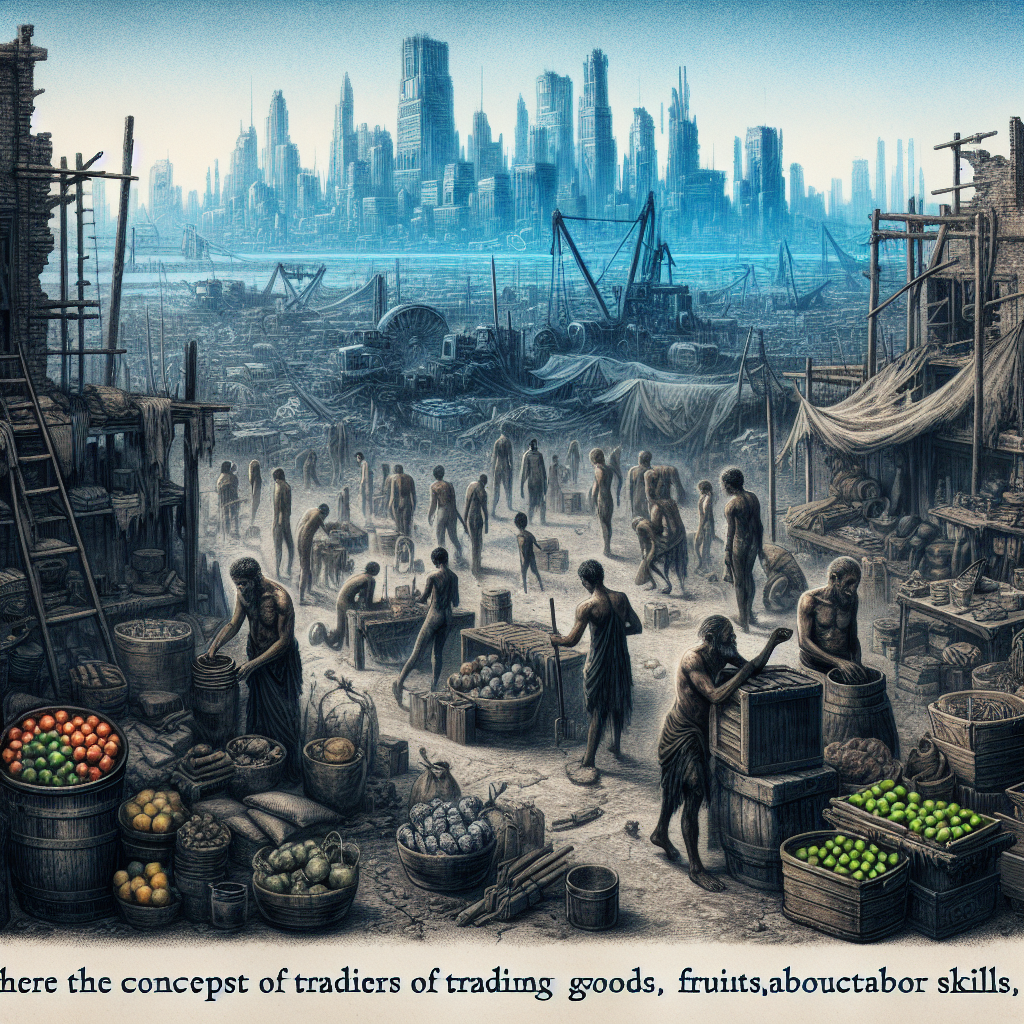In a world where the future is uncertain and economies can collapse, developing bartering skills becomes an essential tool for survival. When traditional forms of currency lose their value, being able to trade goods and services with others becomes paramount. So, how can you hone your bartering skills for a post-collapse economy? It all starts with understanding the value of items, building a network of trusted individuals, and mastering the art of negotiation. By navigating this new economic landscape, you can thrive even in the face of adversity.

Why Bartering Skills Are Important in a Post-Collapse Economy
In a post-collapse economy, where traditional currency may become scarce or lose its value, bartering skills take on a whole new level of importance. Bartering is the exchange of goods or services without the use of money, and its significance lies in the fact that it allows individuals to acquire essential items or services they need in exchange for items or skills they possess. Developing strong bartering skills can be a vital means of survival and ensuring your well-being in this type of economic environment.
Understanding the Concept of Bartering
Before diving into the specifics of developing bartering skills, it’s important to have a solid understanding of what bartering truly is. Bartering is a system of trade that has been used throughout history, predating the use of money. It involves two parties agreeing to exchange goods or services of equal value, without the need for a medium of exchange, such as currency. This direct trading system allows individuals to obtain what they need by utilizing their own resources, skills, and assets.
The Significance of Bartering in a Post-Collapse Economy
In a post-collapse economy, where traditional economic systems may no longer function, bartering becomes a primary method of obtaining necessities. Without a stable currency or readily available goods in stores, bartering allows individuals to meet their needs and wants by directly trading with others. It fosters a sense of self-reliance, encourages community engagement, and promotes the efficient allocation of resources. Bartering can also serve as a form of social currency, helping to build trust, relationships, and cooperation among individuals in a community.
Building a Solid Foundation for Bartering Skills
To develop effective bartering skills, it is essential to lay a solid foundation that includes assessing your own skills and resources, researching the needs and wants of others, identifying potential bartering partners, and setting specific goals for skill development.
Assessing Your Skills and Resources
Begin by evaluating your own skills, experiences, and available resources. What unique abilities or talents do you possess? What tangible items do you have that could be valuable in a post-collapse economy? By recognizing and understanding your own assets, you can better determine what you can offer in a bartering exchange.
Researching the Needs and Wants of Others
To engage in successful bartering, it is crucial to research and understand the needs and wants of others within your community or potential bartering network. What items or skills are in high demand? What resources are scarce or difficult to obtain? By identifying these needs, you can tailor your own offerings to better meet the demands of others.
Identifying Potential Bartering Partners
Next, take the time to identify potential bartering partners. Look for individuals within your community or online who possess the skills or resources you may require. Building a diverse network of bartering partners allows for a wider range of available goods and services, facilitating more successful exchanges.
Setting Goals for Developing Bartering Skills
Finally, set specific goals for developing your bartering skills. Determine which skills you need to acquire or improve upon to enhance your ability to barter effectively. Set timelines and measurable objectives to track your progress and ensure steady growth in your capabilities.

Enhancing Communication and Negotiation Skills
Effective communication and negotiation skills are invaluable when it comes to bartering. These skills help build trust, establish mutually beneficial agreements, and resolve any conflicts or disagreements that may arise during the process.
The Role of Effective Communication in Bartering
Clear and concise communication is vital during the bartering process. Being able to articulate your needs and understand the needs of others is crucial for successful exchanges. Use active listening to fully comprehend the desires and requirements of your potential trading partners.
Practicing Active Listening and Empathy
Active listening involves fully engaging with the person speaking, focusing on their words and nonverbal cues. By actively listening, you can better understand the underlying needs and motivations of others, allowing for more effective negotiations. Empathy is also essential, as it enables you to relate to and understand the perspective of your trading partners, leading to more satisfying and equitable trade arrangements.
Developing Strong Negotiation Techniques
Negotiation skills are critical for reaching mutually beneficial agreements. Practice techniques such as finding common ground, compromising when necessary, and exploring creative solutions. The ability to negotiate effectively can help secure more favorable outcomes in bartering exchanges.
Acquiring Valuable Goods and Skills for Bartering
To engage in successful bartering, it is essential to identify high-demand items, learn valuable skills for a post-collapse economy, and invest in tools and equipment for producing goods.
Identifying High-Demand Items
Understanding the items or resources that are in high demand can provide you with an advantage when it comes to bartering. Consider goods or services that people commonly need or desire, such as food, water, shelter, clothing, medical supplies, and tools. Acquiring these items can increase your bartering power and improve your chances of obtaining what you need.
Learning Valuable Skills for a Post-Collapse Economy
In a post-collapse economy, certain skills become particularly valuable. Learning skills related to food production, such as gardening or animal husbandry, can provide a consistent source of sustenance and make you a valuable trading partner. Skills in areas such as construction, first aid, and basic mechanical repairs can also be highly sought after.
Investing in Tools and Equipment for Producing Goods
Having the necessary tools and equipment to produce goods can significantly enhance your bartering abilities. Whether it’s gardening tools, sewing machines, or woodworking equipment, investing in these resources allows you to create valuable items that can be traded for other goods or services.
Establishing a Bartering Network
Building a strong bartering network is crucial for successful exchanges. By actively building trust, participating in local community events, and joining online bartering communities, you can expand your opportunities and options for trading.
Building Trust and Relationships
Trust is the foundation of any successful bartering relationship. Act with integrity, honesty, and reliability to build trust within your community. Establishing strong relationships with potential bartering partners can lead to long-term, mutually beneficial exchanges.
Participating in Local Community Events
Engaging with your local community by participating in events or activities can help you meet potential bartering partners and discover new opportunities. Attend farmers’ markets, craft fairs, or community gatherings to connect with individuals who may share similar interests or have desirable goods or skills.
Joining Online Bartering Communities
In today’s digital age, online bartering communities provide an additional avenue for connecting with potential trading partners. Join online platforms or forums dedicated to bartering, where you can exchange goods and services with individuals from different geographic locations.
Ensuring Fair Bartering Practices
Fairness and ethical conduct are key principles to uphold during bartering exchanges. By understanding the principles of fair trade, avoiding exploitative or unethical practices, and negotiating mutually beneficial agreements, you can ensure a positive and harmonious bartering experience.
Understanding the Principles of Fair Trade
Fair trade encompasses principles such as equity, transparency, and respect. Strive to ensure that both parties involved in a bartering exchange receive a fair and equitable outcome. Avoid taking advantage of others’ vulnerabilities or giving disproportionately less in return.
Avoiding Exploitative or Unethical Practices
Bartering should be conducted with integrity and fairness. Avoid engaging in exploitative or unethical practices, such as hoarding valuable resources, price gouging, or deceiving others about the condition or value of the items being exchanged.
Negotiating Mutually Beneficial Agreements
In any bartering exchange, strive for agreements that benefit both parties. Seek solutions that satisfy the needs and desires of both individuals involved, resulting in a fair and equitable outcome. Collaboration and compromise are key elements of reaching mutually beneficial agreements.
Managing and Protecting Bartered Assets
Proper management and protection of bartered assets are essential to ensure their security and longevity. By developing proper inventory and records, implementing secure storage and transportation methods, and protecting against theft or fraud, you can safeguard the items acquired through bartering.
Developing Proper Inventory and Records
Maintaining detailed records and inventory of the items acquired and traded through bartering helps track assets and ensure accountability. Keep records of the type, quantity, and value of items exchanged and acquired to avoid confusion or disputes.
Implementing Secure Storage and Transportation Methods
To protect bartered assets from theft, damage, or loss, it is important to invest in secure storage and transportation methods. Utilize lockable containers, secure storage facilities, and appropriate packaging materials to safeguard traded goods during transit or storage.
Protecting Against Theft or Fraud
Be vigilant in protecting against potential theft or fraudulent practices during bartering exchanges. Verify the authenticity and condition of items before agreeing to trade. Use trusted intermediaries or witnesses for high-value exchanges or when dealing with unfamiliar trading partners. Maintain open lines of communication to address any concerns or discrepancies that may arise.
Adapting to a Changing Bartering Landscape
The bartering landscape may experience shifts in supply and demand, advancements in technology, and the emergence of alternative currencies. To thrive in this changing environment, it is important to understand these shifts, adapt to new technology and alternative currencies, and continuously learn and update your bartering skills.
Understanding Shifts in Supply and Demand
Monitoring and understanding shifts in supply and demand allows you to adjust your bartering offerings accordingly. Be aware of changing needs and trends within your community and beyond. By staying informed, you can adapt your bartering strategy to meet the evolving demands of others.
Adapting to New Technology and Alternative Currencies
Advancements in technology and the introduction of alternative currencies, such as cryptocurrencies, may impact the bartering landscape. Embrace new technologies that facilitate bartering exchanges and consider the potential benefits and risks of engaging in alternative currency systems.
Continuously Learning and Updating Bartering Skills
The practice of bartering is dynamic and constantly evolving. To remain successful, it is essential to continuously learn and update your bartering skills. Stay informed about new techniques, goods, or services that may enhance your abilities as a barterer. Seek out educational resources, workshops, or mentorship opportunities to expand your knowledge and improve your bartering proficiency.
Overcoming Challenges and Obstacles in Bartering
Bartering in a post-collapse economy is not without its challenges. However, by developing strategies to deal with scarcity or limited resources, resolving conflicts and disputes, and maintaining resilience and perseverance, you can effectively navigate these obstacles.
Dealing with Scarcity or Limited Resources
In a post-collapse economy, scarcity or limited resources may be a common challenge. To overcome this obstacle, focus on building self-sufficiency by acquiring skills or resources that are in high demand. Diversify your bartering portfolio to include a range of items or services that can be traded even when certain resources are scarce.
Resolving Conflicts and Disputes
Conflicts or disputes may arise during bartering exchanges, particularly when value assessments differ or expectations are not met. To address conflicts, communicate openly and seek a mutually agreeable resolution. Practice patience, empathy, and compromise to maintain positive relationships and ensure fair outcomes.
Maintaining Resilience and Perseverance
Bartering in a post-collapse economy can be challenging and may require perseverance. Stay resilient by maintaining a positive mindset and adaptability. Learn from any setbacks or failures, continuously improve your skills, and maintain a steadfast commitment to your bartering goals.
Preparing for the Transition to a Post-Collapse Economy
To successfully transition to a post-collapse economy, it is crucial to develop self-sufficiency and sustainability, learn additional survival skills, and create a diversified bartering portfolio.
Developing Self-Sufficiency and Sustainability
Building self-sufficiency involves acquiring the necessary skills and resources to meet your basic needs independently. Develop sustainable practices such as growing your own food, harvesting rainwater, or generating alternative energy sources. By reducing reliance on external systems, you become more resilient in a post-collapse economy.
Learning Additional Survival Skills
Although bartering is essential, it is also crucial to learn additional survival skills that can ensure your well-being in a post-collapse environment. Skills such as first aid, self-defense, fire-making, and navigation can improve your chances of thriving during challenging times.
Creating a Diversified Bartering Portfolio
Ensure your bartering portfolio is diversified by offering a range of goods and services that cater to various needs and preferences. This diversification provides you with greater flexibility and adaptability in meeting the demands of others. Continuously assess the market and adapt your offerings accordingly to maintain a robust bartering portfolio.
In conclusion, developing bartering skills is of utmost importance in a post-collapse economy. Understanding the concept of bartering, building a solid foundation for bartering skills, enhancing communication and negotiation capabilities, acquiring valuable goods and skills, establishing a bartering network, ensuring fair practices, managing and protecting bartered assets, adapting to a changing bartering landscape, overcoming challenges and obstacles, and preparing for the transition to a post-collapse economy are all crucial steps in becoming a skilled and successful barterer. By recognizing the significance of bartering and actively investing in the development of your bartering skills, you increase your chances of thriving and securing your well-being in a post-collapse economic environment.
